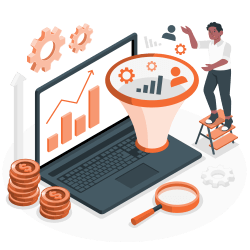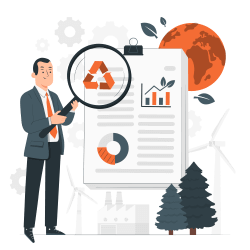- Home »
- ERPNext »
- Industry »
- Agriculture »
Agriculture
In the dynamic landscape of the agriculture industry, businesses face multifaceted challenges that require a comprehensive and integrated approach to management

Enterprise Resource Planning (ERP) systems have emerged as indispensable tools for agricultural enterprises, offering a suite of modules and features tailored to address the unique needs of this sector. Let’s delve into the various ERP modules and their contributions to the growth and sustainability of agriculture businesses.
Risk Management and Mitigation
ERP modules provide advanced risk assessment tools, utilizing historical data and predictive analytics. This empowers farmers to identify potential threats such as pest infestations or adverse weather conditions well in advance. By implementing proactive risk mitigation strategies, agriculture businesses can protect their crops and ensure consistent yields. In agriculture, risk management is paramount to ensure the success of farming operations. ERP solutions tailored to agriculture, such as those designed for precision farming, offer robust tools for identifying, assessing, and mitigating risks.


Data Driven Decision Making
ERP systems capture vast amounts of data related to crop performance, soil health, and market trends. Through data analytics and modeling, these modules assist farmers in making data-driven decisions. For example, they can optimize planting schedules based on historical yield data and market demand, ultimately leading to higher profits. Agriculture-focused ERP solutions provide powerful analytics and reporting tools that enable farmers to collect, analyze, and visualize data from various sources, such as IoT sensors, drones, and historical farming records.
Sustainability and Certification
ERP solutions help agriculture businesses track and document sustainable farming practices, such as reduced chemical usage or water conservation efforts. This information is crucial for obtaining certifications like organic or fair trade, which not only expand market access but also command premium prices for products. These systems support sustainability initiatives by tracking and managing resource consumption, reducing waste, and optimizing resource allocation. Moreover, they facilitate compliance with industry standards and certifications related to organic farming, fair trade, and environmental regulations.
Resource Optimization and Efficiency
Agriculture ERP systems offer granular insights into resource utilization. For instance, they can monitor soil conditions, weather forecasts and historical data to recommend precise irrigation schedules and fertilizer application rates. This level of precision maximizes resource efficiency, minimizes waste and lowers operational costs. By monitoring soil health, weather conditions, and crop growth patterns, these systems recommend precise irrigation schedules, fertilizer applications, and pest control measures. The result is not only increased resource efficiency but also reduced environmental impact and improved farm profitability.


Cost Analysis and Profitability Management
Comprehensive financial modules within ERP systems enable in-depth cost analysis at every stage of the agricultural production cycle. By identifying cost drivers and profit margins, businesses can implement cost-saving measures and develop robust financial strategies for sustainable growth. By integrating financial data with operational insights, these systems help farmers make informed decisions on pricing, crop rotation, and investment strategies. This financial visibility is essential for long-term sustainability and growth in the agriculture sector.
Scalability and Adaptability
ERP systems are designed to accommodate the evolving needs of agriculture businesses. As these enterprises grow or diversify into new markets, ERP modules can seamlessly scale to meet increased operational demands, preserving their effectiveness and utility. The agricultural industry is constantly evolving, and ERP solutions designed for agriculture are built to scale and adapt to changing needs. Whether you’re a small family farm or a large agribusiness, these systems can grow with your operations.
Precision Agriculture
Agriculture ERP modules facilitate precision agriculture practices by integrating data from various sources, including sensors, drones and satellite imagery. This data is used to create detailed field maps and enable variable-rate application of inputs, such as fertilizers and pesticides. Precision agriculture enhances crop yields, minimizes resource usage, and reduces environmental impact. This data-driven approach allows farmers to precisely apply resources like water, fertilizers, and pesticides, resulting in optimal crop yield, reduced environmental impact, and enhanced farm profitability.


Supply Chain Integration and Collaboration
ERP modules facilitate seamless integration with suppliers, distributors and other stakeholders in the supply chain. Real-time collaboration and information sharing minimize delays and ensure the timely delivery of agricultural products to markets, enhancing competitiveness and customer satisfaction. This integration enhances traceability, reduces supply chain inefficiencies, and ensures the timely delivery of quality products to consumers. By fostering collaboration and transparency, agriculture-focused ERPs contribute to the overall sustainability and success of the agricultural supply chain.
Crop Traceability and Compliance
ERP systems ensure complete traceability throughout the supply chain. This level of transparency is essential for complying with food safety regulations and meeting consumer demands for product traceability. It also helps in swiftly identifying the source of any quality issues or contamination incidents, thereby safeguarding brand reputation. This traceability ensures that food products can be quickly and accurately traced back to their source in case of contamination or recalls. Additionally, these systems support compliance with food safety regulations and certifications.
Market Analysis and Planning
ERP systems incorporate sophisticated market analysis tools, allowing agribusinesses to gather insights into consumer preferences, emerging trends and competitor activities. Armed with this information, businesses can adjust their production plans and marketing strategies to align with market demands, ensuring product relevance and maximizing profitability. Market analysis is essential for successful agricultural operations. Agriculture-focused ERP solutions offer market analysis and planning tools that enable farmers to monitor market trends, forecast demand, and make informed decisions on crop selection and pricing.


